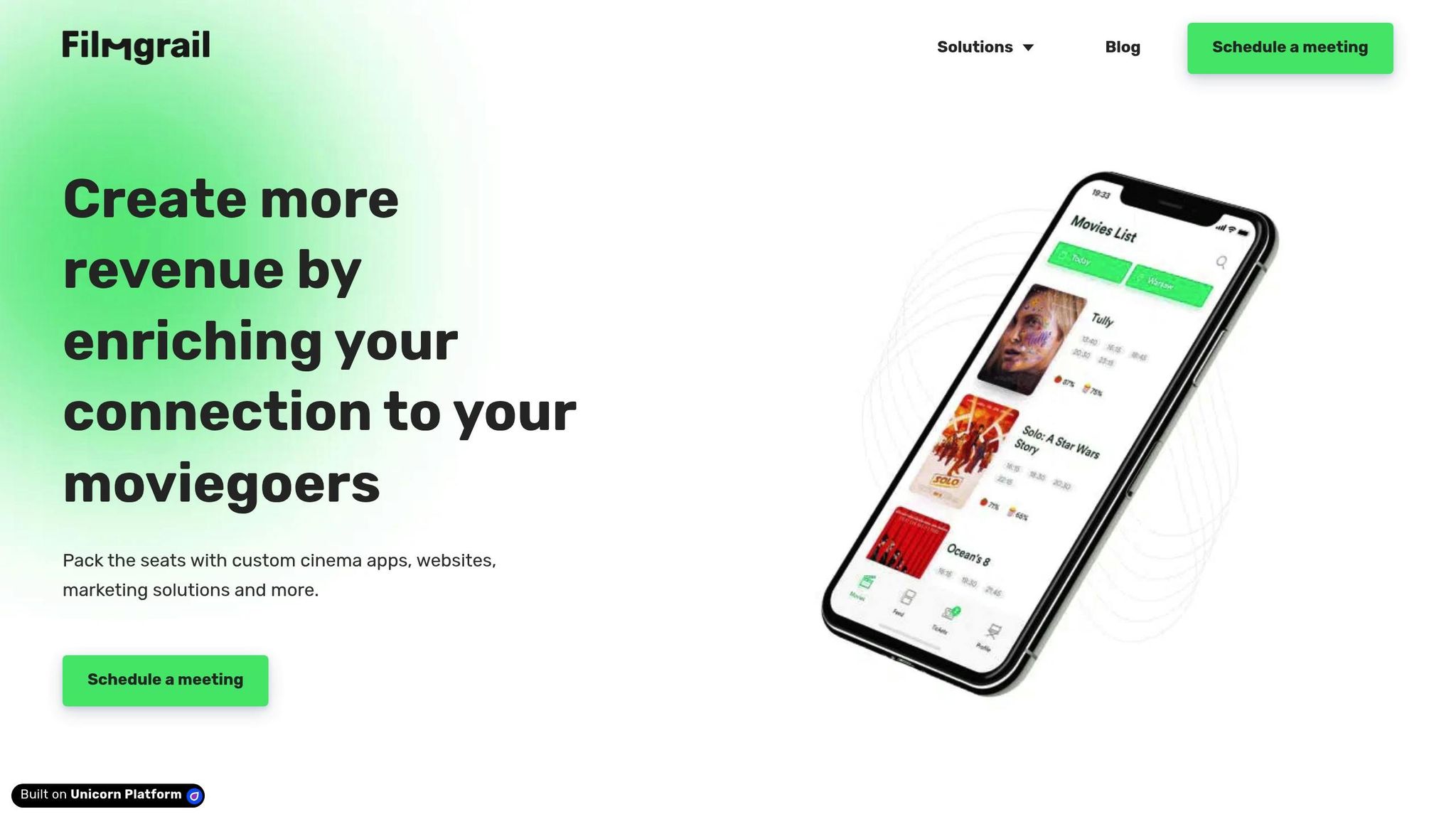Online ticket fraud is a growing threat. Scammers are targeting both customers and cinemas, exploiting digital systems to steal money, personal data, and access to tickets. This not only causes financial losses but also damages trust and reputation. Here’s what you need to know:
Key Fraud Risks:
- Fake Tickets: Counterfeit or duplicated tickets sold to multiple buyers.
- Phishing Scams: Fraudulent websites or emails trick users into sharing payment details.
- Social Media Scams: Fake profiles or event pages promoting fraudulent ticket sales.
- Illegal Resale: Tickets bought with stolen credit cards resold for profit.
- Friendly Fraud: Customers falsely claiming unauthorized purchases, leading to chargebacks.
Solutions:
- Stronger Security: Use multi-factor authentication (MFA), tokenization, and real-time fraud detection tools.
- Customer and Staff Training: Teach customers to spot scams and train staff to handle fraud cases effectively.
- Advanced Technology: Implement dynamic QR codes, digital watermarking, and machine learning to detect and prevent fraud.
Platforms like Filmgrail combine secure systems with user-friendly features to protect transactions while improving the customer experience. Fraud prevention is key to safeguarding revenue and maintaining trust in digital ticketing.
Beware of Online Ticket Scams: Tips to Protect Yourself from Fraud
Main Fraud Risks in Online Ticket Sales
U.S. cinema operators are grappling with three major fraud threats that not only cut into their revenue but also shake customer confidence. These scams take advantage of the convenience of digital ticketing, targeting both moviegoers and the cinemas themselves.
Fake and Counterfeit Tickets
One of the biggest challenges is scammers producing convincing counterfeit tickets or selling the same legitimate ticket to multiple buyers. Here's how it works: fraudsters duplicate a genuine ticket's confirmation - whether through email, screenshots, or QR codes - and sell it to several unsuspecting buyers. Unfortunately, only the first person to present the ticket gains entry, leaving others locked out despite having paid, sometimes at inflated prices on secondary markets.
Counterfeit tickets are another headache. Scammers replicate ticket designs, logos, and QR codes to create fakes that can fool both customers and staff. These fake tickets often go unnoticed until entry is denied because the QR code either doesn't work or has already been used.
The ripple effects of this fraud go beyond lost ticket sales. Cinemas face chargebacks when customers dispute credit card transactions for tickets they couldn't use, and administrative costs rise as staff deal with these disputes. Even worse, customers often blame the cinema for their bad experience, damaging the brand's reputation even though the fraud originated elsewhere.
Phishing and Social Media Scams
Scammers aren’t just duplicating tickets - they’re also tricking customers directly through phishing and social media schemes. Fraudsters create websites that mimic official cinema chains, tricking customers into sharing payment details or buying tickets that don’t exist. These fake sites are often so well-crafted they appear legitimate, down to the smallest details.
Social media has become another hotspot for ticket scams. Fraudsters set up fake profiles and event pages, advertising fraudulent tickets to popular premieres or special events. They often create urgency by claiming tickets are in limited supply or offering exclusive deals that sound too good to pass up.
Red flags for these scams include misspelled or unusual URLs, requests for payment via cryptocurrency or gift cards, and sellers avoiding official ticket transfer systems. Legitimate ticketing platforms use secure payment methods and provide verifiable contact details, whereas fraudulent sites often lack these safeguards.
Phishing emails are another common tactic. Scammers impersonate well-known cinema chains, sending fake confirmations or promotional offers that link to malicious websites. Once customers enter their payment details, scammers can use the stolen information for further fraud or sell it to others.
Illegal Resale and Credit Card Fraud
Another major issue is the use of stolen credit card information to buy legitimate tickets, which are then resold for profit on secondary markets. This creates a chain of victims: the original cardholder, the unsuspecting ticket buyer, and the cinema, which often ends up bearing the financial burden.
When stolen cards are used, cinemas face chargebacks and additional fees, cutting into both revenue and profits. On top of that, they may need to turn away customers who unknowingly purchased fraudulently obtained tickets.
Friendly fraud is an emerging problem, accounting for 38% of all chargebacks in the ticketing industry, with a 41% rise since 2020. In these cases, customers claim their transactions were unauthorized or that they didn’t receive the tickets, even when the purchase was legitimate. The average loss from friendly fraud in ticketing is about $112 per transaction.
Secondary markets are especially vulnerable. Scammers often use peer-to-peer payment apps that lack purchase protection, making it almost impossible for victims to recover their money. The anonymity of online transactions adds another layer of difficulty for law enforcement to track and prosecute these criminals.
Digital ticket fraud is twice as common as box office fraud, largely because it lacks the face-to-face verification of in-person sales. While online ticketing offers convenience, it also opens the door to new vulnerabilities that fraudsters are quick to exploit.
Solutions to Stop Online Ticket Fraud
Tackling ticket fraud effectively requires a combination of advanced technology, staff training, and improved processes. By adopting a layered approach, cinema operators can minimize fraud-related losses and enhance customer confidence in their services.
Improving Security Measures
Strengthening security begins with requiring multi-factor authentication (MFA) for customer accounts and securing payment gateways. Techniques like tokenization, Address Verification Service (AVS), and CVV checks help block unauthorized transactions. While MFA adds an extra step for users, it’s a proven method to deter fraud.
Modern payment systems utilize tokenization, replacing sensitive card data with unique tokens. This ensures that even if data is stolen, it becomes useless to fraudsters. Many of these systems also include automated risk scoring, flagging suspicious transactions based on factors like location, purchase patterns, or device characteristics.
Real-time fraud detection tools, such as velocity checks, monitor bulk purchases and unusual behaviors. These systems track the number of tickets bought from a single account, IP address, or payment method within a specific timeframe, helping to identify and block fraudulent activity instantly.
Geolocation verification compares the buyer's stated location with their IP address and device location. If someone claims to be purchasing tickets for a local theater but their digital footprint shows they’re in another state or country, the transaction can be flagged for further review.
Training Customers and Staff
Education is a critical part of fraud prevention. Customer awareness campaigns should teach moviegoers how to recognize suspicious activity, such as deals that seem too good to be true, unusual URLs, or payment methods without buyer protection.
Cinema staff also need thorough training on identifying and handling fraudulent tickets. Employees should learn how to verify QR codes, recognize counterfeit tickets, and manage fraud-related incidents professionally. Training should also include proper documentation procedures and escalation protocols for fraud cases.
Clear and consistent communication about official ticketing channels is essential. Cinemas should prominently display their authorized ticket sellers on their websites and social media. Regular reminders help steer customers away from fraudulent websites.
Staff training should also cover behavioral cues associated with fraud. Individuals presenting fake tickets might appear nervous, avoid eye contact, or become defensive when questioned. While these behaviors aren’t definitive proof of fraud, they can prompt staff to examine tickets more closely.
Having incident response protocols ensures staff handle fraud situations uniformly. These procedures should outline when to involve law enforcement, how to document evidence, and how to assist legitimate customers affected by fraud. Such measures create a foundation for integrating advanced technological defenses.
Using Technology for Fraud Prevention
Technology offers some of the most effective tools for combating ticket fraud. One such solution is dynamic QR codes, which change periodically or include time-sensitive elements. Unlike static codes, these are nearly impossible to duplicate and can be verified against the cinema's database in real-time.
Digital watermarking adds another layer of security. These invisible features - such as unique patterns, hidden text, or embedded data - are extremely hard to replicate. Even if fraudsters copy the visible parts of a ticket, the watermark remains out of reach.
Blockchain technology is emerging as a game-changer for ticket authentication. Each ticket is assigned a unique digital signature stored on an unalterable ledger. This makes duplicating or altering ticket information impossible. While still in its early stages for cinemas, blockchain is gaining traction for high-value events and premium screenings.
Machine learning algorithms continuously refine fraud detection by analyzing patterns in both legitimate and fraudulent transactions. These systems learn from each attempted scam, improving their ability to spot new fraud techniques. They can identify subtle irregularities, such as unusual purchasing habits or device characteristics linked to fraud.
Platforms also employ device fingerprinting to create unique profiles based on technical details like browser settings, screen resolution, and installed plugins. This helps detect when the same device is used for multiple fraudulent purchases, even if different accounts or payment methods are involved.
Finally, platforms like Filmgrail integrate security with customer engagement tools. By blending robust security features with tools that enhance the moviegoing experience, Filmgrail ensures customers feel secure without being inconvenienced. Its focus on engaging local audiences builds trust, encouraging customers to stick to official ticketing channels while safeguarding transactions and boosting cinema revenue.
sbb-itb-b1b0647
How Filmgrail Supports Secure Ticketing

As fraud risks grow, ensuring secure transactions and keeping users engaged are more critical than ever. Filmgrail rises to this challenge by combining advanced technical strategies with a focus on user experience to safeguard ticketing and enhance customer satisfaction.
Filmgrail’s platform is designed to block fraud while maintaining a smooth ticketing process. By offering secure transactions and boosting customer confidence, it addresses issues like counterfeit tickets and online scams, which can undermine trust in digital ticketing.
Filmgrail's Security-First Design
Security is at the core of Filmgrail’s ticketing system. The platform integrates seamlessly with payment gateways to ensure safe transactions. Real-time inventory management helps prevent overbooking and ensures accurate tracking of seat availability. To validate tickets securely and efficiently, the system uses barcode and ticket scanning features. Additionally, Filmgrail prioritizes the protection of sensitive customer data through robust data management tools. The checkout process is optimized for simplicity and speed, encouraging users to complete their purchases through official channels.
Building Trust Through Customer Engagement
Trust is key to steering customers away from fraudulent ticket sources, and Filmgrail achieves this through meaningful customer engagement. Its mobile and web apps provide an immersive experience before, during, and after a trip to the cinema. Features like personalized push notifications keep users informed about new offers and upcoming releases. Local audience reviews and ratings reinforce the credibility of the official ticketing platform. Auto-playing trailers and video stories further enhance user interaction, keeping customers connected to the platform. This approach not only builds trust but also contributes to better revenue outcomes.
Boosting Revenue and Customer Experience
Filmgrail’s security efforts are closely tied to features that drive revenue and improve the customer experience. Flexible ticketing options, such as print-at-home tickets, ensure secure transactions while accommodating customer preferences. Reserved seating options make planning a visit more convenient, and the platform’s mobile apps support smooth cross-device transactions. By blending strong security with an engaging user interface, Filmgrail encourages repeat purchases and organic growth, shrinking the space for ticket fraud. The platform demonstrates that preventing fraud doesn’t have to come at the cost of customer satisfaction - both can thrive together.
Conclusion and Key Takeaways
Online ticket fraud poses a serious threat to both cinema revenue and customer trust. Common issues like fake tickets, phishing scams, illegal resales, and credit card fraud require a well-rounded strategy. This means combining advanced technology, educating both staff and customers, and creating secure, engaging platforms that encourage users to stick with official ticketing channels.
A multi-layered approach is essential. Cinemas need to invest in tools like bot blockers and fraud detection systems, train their teams to spot scams, and guide customers toward secure ticket sources. Technology is a key ally here - automated fraud detection, secure payment systems, and real-time monitoring can catch suspicious behavior before it causes damage. But technology alone isn’t enough. Pairing these tools with proactive customer engagement is what truly makes a difference.
Take Filmgrail as an example. Their solutions seamlessly blend security and customer engagement, delivering impressive results. Cinemas using their platform have seen an 89% annual growth in digital ticket sales and four times the level of moviegoer engagement compared to industry standards. As Daniel Eikeland from Bergen Kino shared:
"Filmgrail has played a determining role in helping us grow our mobile presence and providing an outstanding moviegoing experience beyond the big screen."
By offering features like personalized experiences, loyalty programs, and easy checkout options, cinemas can make unauthorized ticket sources less appealing while protecting their revenue and reputation.
Fraud prevention is an ongoing battle. As scammers adapt, cinemas must consistently update their security measures and educate their audiences. Investing in these efforts not only shields revenue but also improves customer satisfaction, paving the way for long-term success. By combining strong security with engaging user experiences, cinemas can protect their bottom line and build trust that lasts.
FAQs
How can I tell if a ticketing website or social media page is legitimate?
To identify trustworthy ticketing websites or social media pages, start by examining the URL closely. Legitimate sites typically have familiar domain names and use secure connections - look for "HTTPS" at the beginning of the web address. Be cautious of URLs that seem unusual or contain spelling errors.
When purchasing tickets through social media, opt for secure payment methods like credit cards or payment platforms that include fraud protection. Avoid using direct wire transfers or peer-to-peer payment apps, as these are common tools for scammers.
For added peace of mind, try to buy tickets directly from official sources or well-known, reputable platforms. If you're handed physical tickets, inspect them carefully - authentic tickets generally feature high-quality printing and sharp graphics, while counterfeit ones often appear poorly made. Staying alert and taking these precautions can help ensure a safe and hassle-free ticket-buying process.
What are the best ways to prevent online ticket fraud using technology?
Preventing online ticket fraud involves utilizing modern technology to safeguard transactions and the ticketing process. Here are some effective strategies:
- Fraud detection systems: These tools analyze transaction behavior in real-time, flagging and stopping suspicious activities before they cause harm.
- Secure payment gateways: Implementing payment systems with multi-factor authentication ensures that only authorized users can finalize purchases.
- Digital ticketing: Tickets embedded with unique QR codes or RFID technology make counterfeiting nearly impossible, ensuring only legitimate ticket holders gain access.
By integrating these tools, businesses can minimize fraud risks and offer customers a safer, more trustworthy ticket-buying experience.
How can cinemas ensure strong security without compromising the customer experience?
Cinemas can strike the right balance between strong security measures and a pleasant customer experience by focusing on discreet, customer-first approaches. One key step is training staff to implement security protocols with professionalism and empathy, ensuring all interactions are respectful and non-intrusive.
Using cutting-edge technology, like AI-driven surveillance systems, can boost security without causing unnecessary interruptions. At the same time, fostering a welcoming atmosphere - through clear communication and subtle yet visible safety measures - helps moviegoers feel secure and appreciated.


